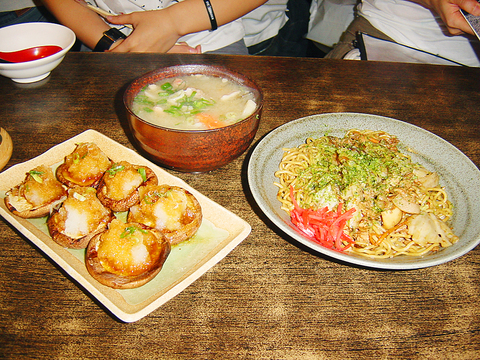If one late night finds you and your friends prowling Taipei for a midnight snack and ice-cold beer, Red Dragonfly Eatery, in the Yongkang neighborhood, is not a bad option. sThe eatery offers a decent range of Japanese-style brochettes and other light snacks commonly seen in Japanese beer houses.
A small, intimate place which seats 20, Red Dragon is popular; patrons usually need to wait around 20 minutes to be seated during the dinnertime rush.
But the wait is worthwhile. The joint offers many grilled, barbecued and deep-fried meat options as well as fried noodles and chicken rice bowls -- standard fare in most Japanese eateries. There is also an extensive drinks menu featuring beer, sake and plum wine.

PHOTO: HO YI, TAIPEI TIMES
A plate of meat or vegetable skewers costs between NT$80 to NT$100 and are must-try snacks. The popular chicken and chicken meatball brochettes are seasoned with the eatery's trademark sauce, which requires 24-hours' preparation time.
You can also order the grilled delicacies plain, with just a sprinkle of salt. Meat-lovers should try the pork neck. Other Red Dragon creations include miso and perilla pork brochettes that come highly recommended by regular patrons.
More exotic snacks include include deep-fried chicken skin (NT$100) and cartilage (NT$150), both of which come in
relatively large portions. The tangy, crunchy skin will should disarm and beckon diners who are usually put off by the sight of greasy subcutaneous fat.
The menu also features sweet fish, shrimp and European carp. This reporter ordered a charcoal grilled carp (NT$250) and was disappointed with its overly salty flavor, which required more than a few sips of beer to slack the resulting thirst.
For people who prefer lighter dishes, the grilled mushroom brochette is a pleasing option. The mashed daikon topping complimented the mushroom and left a fresh taste on the tongue.
Another highlight was the pork miso soup (NT$80). The cabbage, carrots and potatoes were stewed to perfection and melted in the mouth.
If you expect attentive service in this eatery, you will most likely be disappointed. The atmosphere is cozy but very casual as the young staff members natter among themselves, and tarry over diners' orders.

On April 26, The Lancet published a letter from two doctors at Taichung-based China Medical University Hospital (CMUH) warning that “Taiwan’s Health Care System is on the Brink of Collapse.” The authors said that “Years of policy inaction and mismanagement of resources have led to the National Health Insurance system operating under unsustainable conditions.” The pushback was immediate. Errors in the paper were quickly identified and publicized, to discredit the authors (the hospital apologized). CNA reported that CMUH said the letter described Taiwan in 2021 as having 62 nurses per 10,000 people, when the correct number was 78 nurses per 10,000

As we live longer, our risk of cognitive impairment is increasing. How can we delay the onset of symptoms? Do we have to give up every indulgence or can small changes make a difference? We asked neurologists for tips on how to keep our brains healthy for life. TAKE CARE OF YOUR HEALTH “All of the sensible things that apply to bodily health apply to brain health,” says Suzanne O’Sullivan, a consultant in neurology at the National Hospital for Neurology and Neurosurgery in London, and the author of The Age of Diagnosis. “When you’re 20, you can get away with absolute

May 5 to May 11 What started out as friction between Taiwanese students at Taichung First High School and a Japanese head cook escalated dramatically over the first two weeks of May 1927. It began on April 30 when the cook’s wife knew that lotus starch used in that night’s dinner had rat feces in it, but failed to inform staff until the meal was already prepared. The students believed that her silence was intentional, and filed a complaint. The school’s Japanese administrators sided with the cook’s family, dismissing the students as troublemakers and clamping down on their freedoms — with

As Donald Trump’s executive order in March led to the shuttering of Voice of America (VOA) — the global broadcaster whose roots date back to the fight against Nazi propaganda — he quickly attracted support from figures not used to aligning themselves with any US administration. Trump had ordered the US Agency for Global Media, the federal agency that funds VOA and other groups promoting independent journalism overseas, to be “eliminated to the maximum extent consistent with applicable law.” The decision suddenly halted programming in 49 languages to more than 425 million people. In Moscow, Margarita Simonyan, the hardline editor-in-chief of the